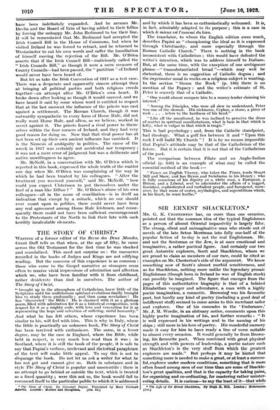THE STORY OF CHRIST.*
WRITING of a former editor of the Rerue des Deux Mondes, Grant Duff tells us that when, at the age of fifty, he came across the Old Testament for the first time he was shocked and scandalized. This need not surprise us : the massacres
recorded in the books of Judges and Kings are not edifying reading. But the converse of this experience is as common : those who come to the Gospel narrative as strangers seem often to receive vivid impressions of admiration and affection which we, who have been familiar with it from childhood, rather desiderate than find in ourselves. The author of The Story of Christ,
" brought up in the atmosphere of Catholicism, knew little of the Scriptures until his multifaneus spiritual evolutions finally brought him to study them profoundly ; and then came revelation ! He has ' discovered ' the Bible ! He is charmed with it as a glorious poem, filled with admiration for it as a historical composition, with respect for it as a mighty code, with love and veneration for it as representing the hope and salvation of suffering, sinful humanity."
And what he has felt others, whose experience has been similar to his, will feel with him. This is why in Italy, where the Bible is practically an unknown book, The Story of Christ
has been received with enthusiasm. The same, in a lesser degree, may be the case in England, where the Bible, while
held in respect, is very much less read than it was ; in Scotland, where it is still the book of the people, it is safe to say that Papini's verbose, irrelevant and rhetorical paraphrase of the text will make little appeal. To say this is not to disparage the book. Do not let us ask a writer for what he
has not got and cannot give us. Both in substance and in style The Story of Christ is popular and unscientific : there is no attempt to go behind or outside the text, which is treated as a fixed quantity ; were this not so, the book would fail to commend itself to the particular public to which it Is addressed
• The Story of Christ. Be Giovanni Pavia Translated by Mary Prichard
Aanetti. London: Hodder sad Stoughirou &LI
and by which it has been so enthusiastically welcomed. It is, in fact, admirably adapted to its purpose ; this is a case in which k mieux est l'ennena du bien.
The translator, to whom the English edition owes much, describes Papini as " championing the ideal as it is expressed through Christianity, and more especially through the Roman Catholic Church." There is nothing in the book inconsistent with Catholicism ; this would have defeated the writer's intention, which was to address himself to Italians. But, at the same time, with the exception of one ambiguous phrase—" transubstantiated bread "—which may well be rhetorical, there is no suggestion of Catholic dogma ; and the imprimatur usual in works on a religious subject is wanting. In the section " Simon the Rock " (p. 186) there is no mention of the Papacy : and the writer's estimate of St. Peter is scarcely that of a Catholic.
" One would ahnost compare him to a money-lender claiming his interest."
" Among the Disciples, who were all slow to understand, Peter was one of the slowest. His nickname, Cephas, a stone, a piece of rock . . . . refers to the hardness of his head."
"Like all the uncultured, he was inclined to perceive the dross of matter in spiritual manifestations, what is base in that which is lofty, what is vulgar in that which is tragic."
This is bad psychology ; and, from the Catholic standpoint, bad theology. What a gulf lies between it and " Upon this rock I will build My Church " ! It is by no means impossible that Papini's attitude may be that of the Catholicism of the future. But it is certain that it is not that of the Catholicism of the past.
The comparison between Pilate and an Anglo-Indian official (p. 349) is an example of what may be called the essential method of the book :—
" Fancy an English Viceroy, who takes the Times, -reads Stuart Mill and Shaw, and has Byron and Swinburne in his library ; who is fully conscious of his dignity as a white man, a European, a Briton, and a Liberal, sent to administer the affairs of a ragged, famished, sophisticated and turbulent people, and hampered, more- over, by that maze of castes, mythologies, and superstitions which, in his heart, he must loathe."






































 Previous page
Previous page